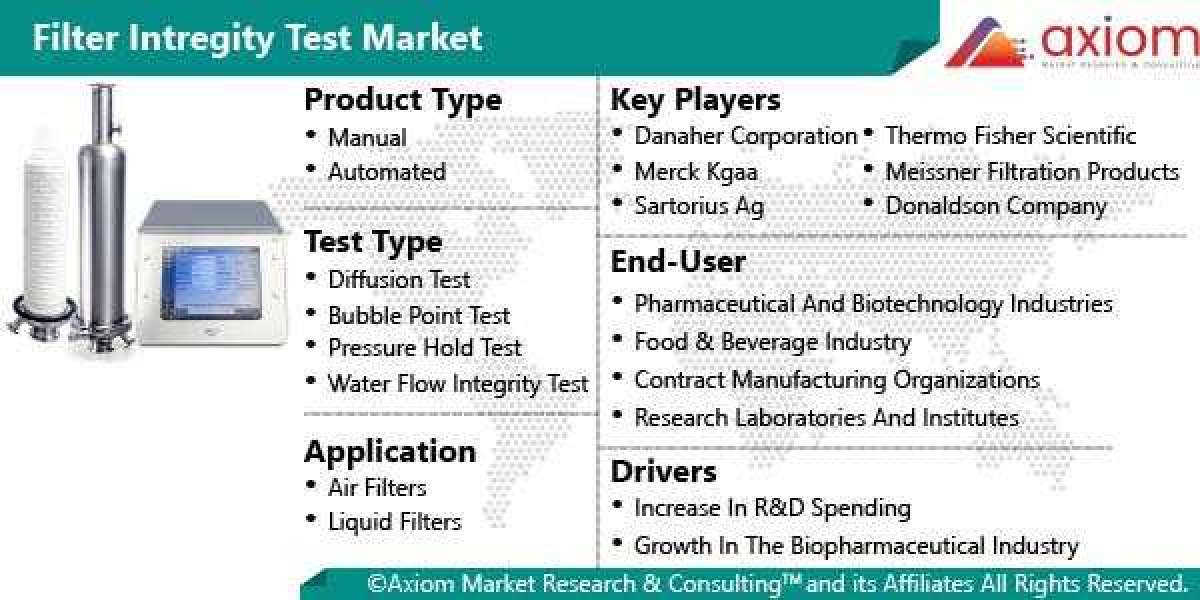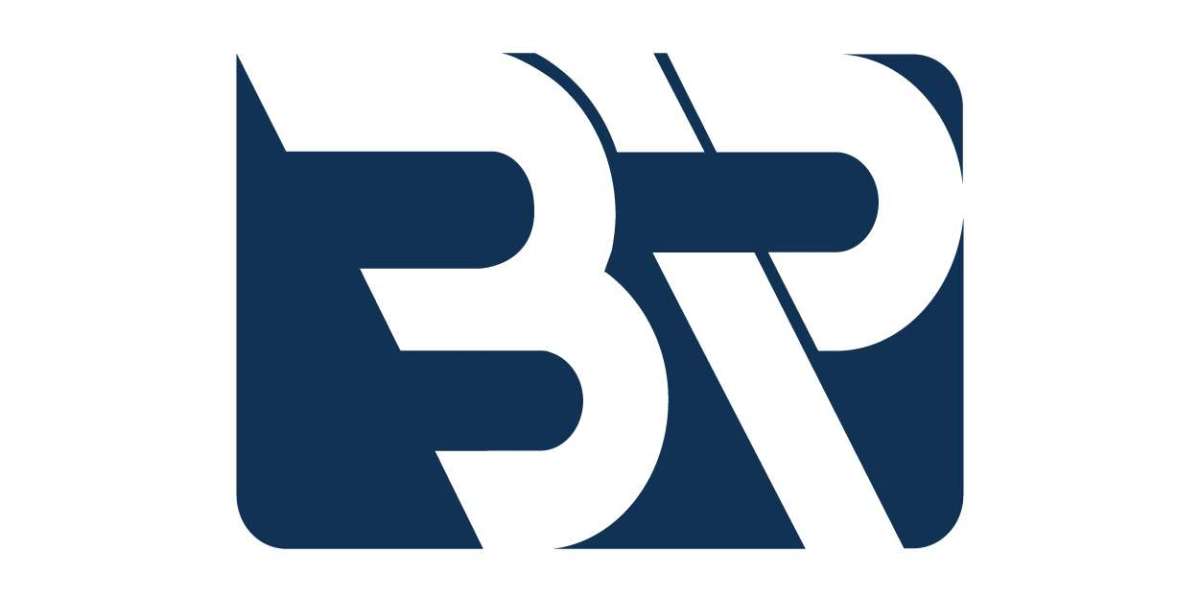A filter integrity test (FIT) Market is a method used to verify the effectiveness and integrity of a filter system. The purpose of the test is to ensure that the filter is capable of retaining all particles and microorganisms of a certain size, as well as to check for any leaks or defects in the filter.
There are several types of FITs that can be used, including bubble point test, diffusive flow test, pressure hold test, and aerosol challenge test. Each of these tests uses a different method to detect any leaks or defects in the filter.
The bubble point test involves applying a liquid to the filter and increasing the pressure until bubbles are observed. The pressure at which the bubbles occur is used to determine the pore size of the filter.
The diffusive flow test involves measuring the rate at which a gas flows through the filter. If the flow rate is lower than expected, this indicates that the filter may be damaged or have a defect.
The pressure hold test involves measuring the pressure drop across the filter over time. A sudden drop in pressure indicates a leak or defect in the filter.
The aerosol challenge test involves exposing the filter to a known concentration of a test aerosol, and then measuring the concentration of the aerosol on both the upstream and downstream sides of the filter. This test can determine the filter's retention efficiency and particle size distribution.
FITs are commonly used in industries such as pharmaceuticals, biotechnology, and food and beverage to ensure the quality and safety of their products. It is recommended that FITs be performed regularly to ensure the continued effectiveness and integrity of the filter system.
Top of Form
Market Dynamic – Global Filter Integrity Test Market
The filter integrity test (FIT) market is driven by several factors, including the increasing demand for clean and pure products in various industries, such as pharmaceuticals, biotechnology, and food and beverage. With the growing focus on quality and safety in these industries, the need for reliable and accurate FITs has also increased.
Another factor driving the FIT market is the increasing adoption of single-use technologies in bioprocessing. Single-use filters are used to reduce the risk of contamination and to simplify the process of cleaning and sterilization. FITs are necessary to ensure the integrity of these single-use filters and to ensure that they are capable of retaining all particles and microorganisms of a certain size.
The development of new technologies and products is also driving the growth of the FIT market. Manufacturers are investing in research and development to improve the accuracy, sensitivity, and speed of FITs, which is increasing the demand for these tests.
On the other hand, the high cost of FITs and the lack of skilled professionals to perform these tests are some of the factors that are limiting the growth of the FIT market. Additionally, the COVID-19 pandemic has disrupted the supply chain of FITs, leading to a shortage of these tests in some regions.
Overall, the FIT market is expected to continue growing in the coming years, driven by the increasing demand for clean and pure products in various industries and the development of new technologies and products. However, the market may face challenges related to cost and availability of skilled professionals in performing these tests.
Top of Form
COVID-19 Impact on Filter Integrity Test Market
The exclusive COVID 19 impact analysis report by Axiom MRC provides a 360-degree analysis of micro and macro-economic factors on the filter integrity test market. In addition, complete analysis of changes on filter integrity test market expenditure, economic and international policies on supply and demand side. The report also studies the impact of pandemic on global economies, international trade, business investments, GDP and marketing strategies of key players present in the market.
Get Free Sample Research Copy for More Industry Insights:
https://www.axiommrc.com/request-for-sample/11081-filter-integrity-test-market-report
Filter Integrity Test Market Segmental Overview
The filter integrity test market comprises of different market segment like product type, test type, application, end user and geography.
Filter Integrity Test Market by Product Type
The filter integrity test (FIT) market can be segmented by product type, based on the different types of FITs available in the market. The major product types in the FIT market include:
- Bubble Point Testers: These are instruments used to perform the bubble point test, which is a widely used method for testing the integrity of filters. Bubble point testers are commonly used in the pharmaceutical and biotechnology industries.
- Diffusive Flow Testers: These instruments measure the rate at which a gas flows through the filter, which can be used to detect any leaks or defects in the filter. Diffusive flow testers are commonly used in the semiconductor and microelectronics industries.
- Pressure Hold Testers: These instruments measure the pressure drop across the filter over time, which can be used to detect any leaks or defects in the filter. Pressure hold testers are commonly used in the food and beverage industry.
- Aerosol Challenge Testers: These instruments expose the filter to a known concentration of a test aerosol, and then measure the concentration of the aerosol on both the upstream and downstream sides of the filter. Aerosol challenge testers are commonly used in the pharmaceutical, biotechnology, and medical device industries.
- Other FIT Instruments: This category includes other types of FIT instruments that are used in specific industries or for specific applications, such as integrity testers for hydraulic and lubrication filters used in industrial machinery.
The market for each of these product types is expected to grow in the coming years, driven by the increasing demand for clean and pure products in various industries and the development of new technologies and products.
Filter Integrity Test Market by Test Type
The filter integrity test (FIT) market can also be segmented by test type, based on the different methods used to perform FITs. The major test types in the FIT market include:
- Bubble Point Test: This method involves applying a liquid to the filter and increasing the pressure until bubbles are observed. The pressure at which the bubbles occur is used to determine the pore size of the filter.
- Diffusive Flow Test: This method involves measuring the rate at which a gas flows through the filter. If the flow rate is lower than expected, this indicates that the filter may be damaged or have a defect.
- Pressure Hold Test: This method involves measuring the pressure drop across the filter over time. A sudden drop in pressure indicates a leak or defect in the filter.
- Aerosol Challenge Test: This method involves exposing the filter to a known concentration of a test aerosol, and then measuring the concentration of the aerosol on both the upstream and downstream sides of the filter. This test can determine the filter's retention efficiency and particle size distribution.
The market for each of these test types is expected to grow in the coming years, driven by the increasing demand for clean and pure products in various industries and the development of new technologies and products. The choice of test type may depend on the specific requirements of the application and the type of filter being tested.
Filter Integrity Test Market by Application
The filter integrity test (FIT) market can also be segmented by application, based on the different industries and applications where FITs are used. The major applications of FITs include:
- Pharmaceutical and Biotechnology: The pharmaceutical and biotechnology industries use FITs to ensure the integrity of filters used in drug development, manufacturing, and testing. This helps to ensure that the final product is pure and free from contaminants.
- Food and Beverage: The food and beverage industry uses FITs to ensure the integrity of filters used in the production of beverages, dairy products, and other food products. This helps to ensure that the final product is safe for consumption and free from contaminants.
- Microelectronics: The microelectronics industry uses FITs to ensure the integrity of filters used in the production of semiconductors, integrated circuits, and other electronic components. This helps to ensure that the final product is free from contaminants that could affect performance.
- Medical Devices: The medical device industry uses FITs to ensure the integrity of filters used in the production of medical devices, such as filters used in dialysis machines and infusion pumps. This helps to ensure that the final product is safe and effective for use in patient care.
- Other Applications: This category includes other industries and applications where FITs are used, such as aerospace and defense, automotive, and industrial manufacturing.
The market for each of these applications is expected to grow in the coming years, driven by the increasing demand for clean and pure products in these industries and the development of new technologies and products. The choice of application may depend on the specific requirements of the industry and the type of filter being tested.
Top of Form
Filter Integrity Test Market by End User
The filter integrity test (FIT) market can also be segmented by end user, based on the different types of organizations and businesses that use FITs. The major end users of FITs include:
- Pharmaceutical and Biotechnology Companies: These companies use FITs to ensure the integrity of filters used in drug development, manufacturing, and testing.
- Contract Manufacturing Organizations (CMOs): CMOs are third-party companies that provide manufacturing services to pharmaceutical and biotechnology companies. These organizations also use FITs to ensure the integrity of filters used in their manufacturing processes.
- Food and Beverage Companies: These companies use FITs to ensure the integrity of filters used in the production of beverages, dairy products, and other food products.
- Microelectronics Companies: These companies use FITs to ensure the integrity of filters used in the production of semiconductors, integrated circuits, and other electronic components.
- Medical Device Companies: These companies use FITs to ensure the integrity of filters used in the production of medical devices, such as filters used in dialysis machines and infusion pumps.
- Other End Users: This category includes other types of organizations and businesses that use FITs, such as research institutions and government agencies.
The market for each of these end users is expected to grow in the coming years, driven by the increasing demand for clean and pure products in these industries and the development of new technologies and products. The choice of end user may depend on the specific requirements of the industry and the type of filter being tested.
Filter Integrity Test Market Key Players
The key players in filter integrity test market are Danaher Corporation, Merck Kgaa, Sartorius Ag, Thermo Fisher Scientific, Meissner Filtration Products Inc, Donaldson Company, Parker Hannifin Corp, Eaton Corporation Plc, Mdi Membrane Technologies and Sh-Surway among others.
Buy Now And Get More Discount:
https://www.axiommrc.com/buy_now/11081-filter-integrity-test-market-report
Axiom Market Research Consulting™ is a full-service market research and data analytics company providing key market intelligence to global companies to take informed business decisions pertaining to their marketing strategy, investments, new product launches, market competition, consumer or end users, social media trends etc.
Axiom Market Research Consulting™ offers market research services such as syndicated market research, custom market research, business consulting, and consumer/end user surveys. Under Business to Consumer (B2C) market research offerings, Axiom MRC assists its clients in finding quantitative information/preferences of its brands and services such as, awareness, usages, satisfaction, tracking, ethnicity etc. Axiom MRC offers data collection services through online surveys, social media, data processing and interpretation.
Axiom MRC with its experienced team of research and data analysts, has delivered more than 5000+ Market Research Projects, 3800+ Data Analytics Projects, 1200+ Business Support Projects and has a 800+ Global Client Base. Axiom Market Research Consulting™ aims to become the preferred market research and data analytics company by providing key market intelligence solutions for client’s business growth
Contact Us:
Axiom Market Research Consulting™
3 Germay Dr. Ste 4 - 4666
Wilmington DE 19804
U.S.:- + 1 (845) 875-9786
U.K.:- + 44 (0) 20 3286 9707
Email: [email protected]
Website: https://www.axiommrc.com/
http://contactsnleads.com/
Blog: https://industrywatch24.com/
https://readbeyondnews.com/
Follow On
LinkedIn: https://www.linkedin.com/company/axiom-market-research-and-consulting/
Twitter: https://twitter.com/AxiommrcCom
Instagram: https://www.instagram.com/axiom_mrc
Facebook: https://www.facebook.com/axiommrc



